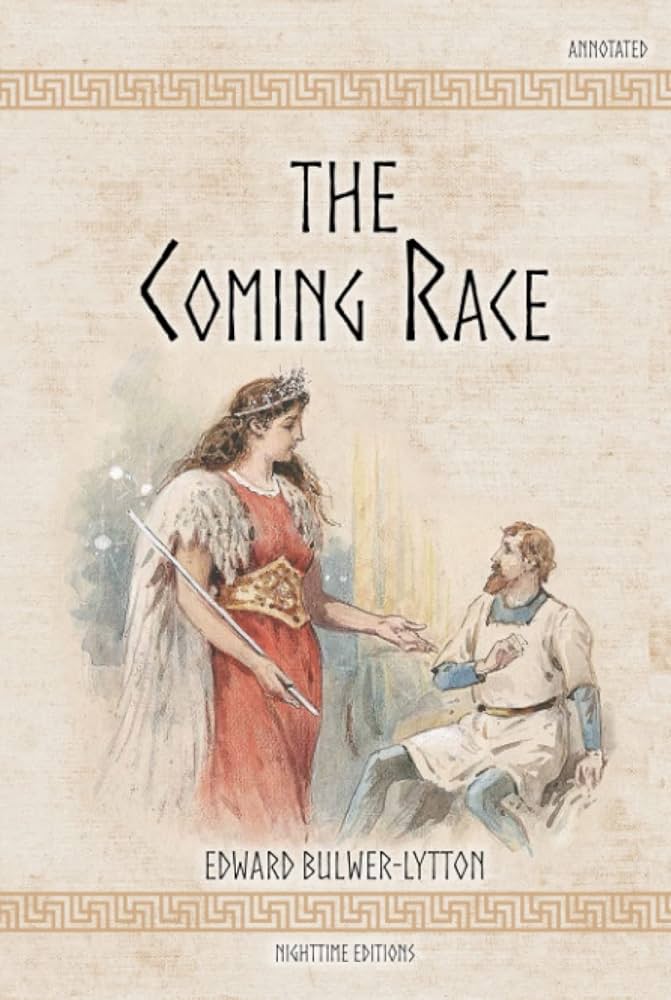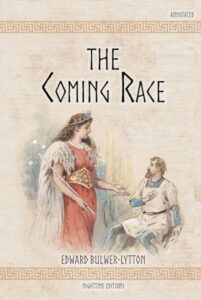Chapter XXIX — The coming Race
byChapter XXIX begins at a moment of quiet dread, when the narrator is stirred from sleep by the luminous presence of Zee. What follows is not just an escape from death but an exit from a world that has reshaped his understanding of progress, ethics, and love. As Zee’s voice breaks the silence, the tension builds—not through noise or violence, but through the eerie calm of a society so advanced, its authority does not waver, even in enacting a quiet execution. The decision to eliminate the narrator was made swiftly, without malice, as a matter of logic. To the Vril-ya, his presence remained a risk too great to justify. Yet for Zee, logic bows to emotion.
She leads him through streets that glow faintly beneath their feet—unnaturally smooth, eerily empty, and humming with unseen energy. The stillness feels unnatural to the narrator, who sees in it not peace, but alien detachment. Where human cities at night pulse with life or whisper with wind, here there is only an ordered hush. Zee’s diadem glows not just to light the way, but to mark defiance against a culture too distant to save him. Her calm urgency reveals a depth of feeling uncommon to her kind, who rarely let emotion bend their choices. This trek is both rescue and rebellion.
At the threshold of the chasm, Zee pauses. She knows this is a boundary neither of them can return from. Yet she speaks gently, as if parting from a world, not just a man. With precision and strength, she lifts him, harnessing the mysterious force of vril—part science, part spirit. The ascent is not dramatic in motion, but monumental in meaning. It represents a crossing back to the flawed, chaotic, yet undeniably human world.
When they emerge into the raw openness of Earth’s surface, the air feels different. Not better, but more real. The stars, distant and indifferent, witness their farewell. Zee does not plead for a promise, nor cry in sorrow. Instead, she offers a wish—not for reunion in life, but in some eventual beyond. The farewell is shaped not by despair, but by a quiet reverence. Her strength is matched only by her restraint.
The narrator, now returned, finds the world familiar and foreign all at once. Streets, faces, customs—all seem dimmer in the absence of that luminous city below. Though his life continues with comfort and eventual retirement, a part of him remains underground, echoing with the memory of another kind of civilization. He cannot speak of it openly; no one would believe. But in quiet moments, when the day is done, he recalls the light, the silence, and the woman who defied her people for him. Her image stays not as a fantasy, but as a moral compass, reminding him of what advanced life could mean—if tempered by compassion.
This chapter also serves as a meditation on separation—not just of worlds, but of values and time. The narrator sees in the Vril-ya a species that has achieved harmony through control, mastery, and cold calculation. Yet in their perfection, something vital has been left behind. Humanity’s chaos, though dangerous, allows for passion, growth, and change. The Vril-ya resist such fluctuations, seeing them as risks. But it is those very risks that gave Zee her strength and the narrator his salvation. That paradox lingers, unanswered but deeply felt.
From a technological lens, Chapter XXIX offers subtle reflections on power. The vril energy, so central to the Vril-ya, is wielded with restraint but also with indifference to its implications. Power without emotion leads to order, but not kindness. Zee’s act becomes a rebellion not against her people, but against a worldview where feeling is seen as weakness. She shows that progress, when stripped of empathy, may reach the stars yet lose its soul. That insight is not lost on the narrator.
In many ways, the story leaves readers with a quiet warning. The narrator’s final reflection—that the separation between the two civilizations should be preserved—echoes less like fear and more like wisdom. Merging the two worlds may invite destruction, not growth. It is not always beneficial to share technology without the heart to guide it. Some gaps are not meant to be bridged, but simply understood. That understanding, as bittersweet as it may be, becomes the narrator’s most enduring gift.
Though the story ends with the surface regained, something deeper remains. Not just in the narrator, but in readers who glimpse what might lie beneath progress, beneath society, even beneath the earth. Chapter XXIX, in its quiet rescue and solemn farewell, carries more than a tale—it carries a lesson. One of love without future, wisdom without arrogance, and power that asks not just what it can do, but what it should do. That question, unanswered, lingers long after the final page.


